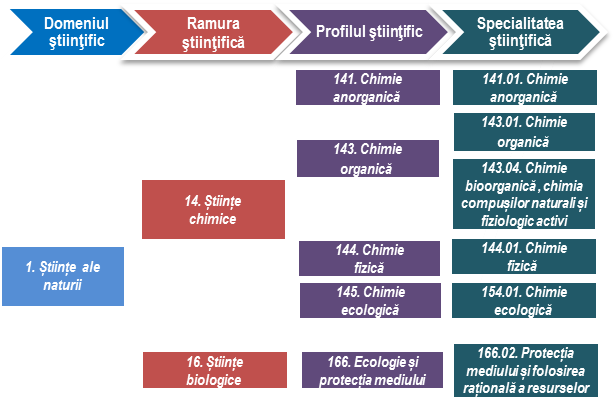Bioinformatics is an interdisciplinary field, that has a rapid evolution and is based on usage of...
Chemical and Technology Sciences
The Doctoral School was established by the Decision of the Supreme Council for Science and Technological Development no. 210 from 25.09.2014..
The basic principles of operation of the Doctoral School::
- equal and fair access to doctoral studies for each person who meets the requirements for enrolling;
- ensuring the quality of the doctoral studies by carrying assessment procedures and periodical improvement of the study programs;
- ensuring the quality and transparency of the process of guiding and assessing PhD students.
The form of organization: a partnership involving the University of the Academy of Sciences, the Institute of Chemistry.
The Management of The Doctoral School
The Council of the Doctoral School consists of 15 members.

Aculina Arîcu
Director,
habilitated doctor
în chemistry,
Associate research professor

Maria Cocu
Scientific secretary,
PhD in chemistry,
Associate research professor
Specialties

PhD supervisors
ARÎCU Aculina, habilitated doctor
BERSUKER Isaac, academician
BULHAC Ion, habilitated doctor
COROPCEANU Eduard, PhD
DUCA Gheorghe, academician
GERU Ion,corresponding member of ASM
GORINCIOI Natalia, PhD
KULCIȚKI Veaceslav, PhD
LUPAŞCU Tudor, corresponding member of ASM
MACAEV Fliur, habilitated doctor
POVAR Igor, habilitated doctor
RUSU Vasile, habilitated doctor
TURTĂ Constantin, academician
UHGUR Nicon, habilitated doctor
VLAD Pavel, academician
Laboratories/Centers
Laboratories of theCenter for Physical Chemistry and Nanocomposites
- Bioinorganic chemistry and nanocomposites
- Physical and chemical methods of research and analysis
- Quantum chemistry, chemical kinetics and magnetic resonance
Laboratories of theCenter for Research and Monitoring of Water Quality
- Atomic spectroscopy
- Water geochemistry
Other laboratories:
- Chemistry of coordination compounds
- Organic synthesis
- Chemistry of terpenoids
- Ecological chemistry
Research methods
- Magnetic resonance and laser spectroscopy
- IR and UV-Vis spectroscopy
- Electron microscopy
- Mass spectrometry
- Gamma-resonance spectroscopy
- Identification material porosity
- Chromatographic methods of analysis








